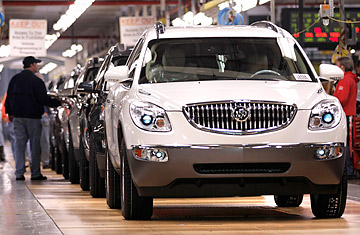
GM Crossover SUV vehicles roll off the assembly line at the General Motors Lansing Delta Township Assembly Plant in Lansing, Michigan.
General Motors Corp. may no longer be the world's biggest automaker, but it still operates the country's largest pension fund. The threat to its pension plans has always been an issue, butit took on a new urgency when GM disclosed April 7 that its plans were underfunded by more than $27 billion, with more than half of that being owed to U.S. workers and retirees. Across town, a post- bankrupt Chrysler faces its own pension shortfall. Moreover, a report last week from the Government Accounting Office (GAO) says the pension crisis in the auto industry could create an unprecedented crisis for the federal Pension Benefit Guarantee Corp., a government-sponsored organization to backstop company pensions.
When the two automakers emerged from bankruptcy reorganization the pension problems were seen as a more distant issue, and presumably one that would be eased by economic growth. But the auto industry is facing a slow recovery, and neither the new GM nor the new Chrysler has produced a profit. Christopher Liddell, GM's new chief financial officer, has stopped short of predicting that GM will be profitable this year, while Chrysler CEO Sergio Marchionne is hoping Chrysler can break even this year. Both GM and Chrysler are also moving to build smaller vehicles, which have traditionally produced smaller profits. The pension funding crisis could begin in 2013, or before either company is fully profitable.
Here are the chief questions raised by the potential pension crisis:
Could taxpayers really be on the hook for UAW pensions?
Yes. GM could face a funding crisis in 2013 or 2014 when, under the current projections, the automaker will be required to make more than $12 billion in contributions to its pension funds to keep them solvent, according to the GAO analysis. Chrysler's estimated future pension obligation is $3 billion. If the companies cannot meet their funding obligations they may have to terminate their plans, and the financial responsibilities (up to government limits) would be assumed by the Pension Benefit Guarantee Corporation. The funding could easily become a serious challenge for the PBGC, which says it is now facing $168 billion in possible plan terminations across a range of companies, many of them auto suppliers. The PBGC is privately funded, but since it was created by an act of Congress and its board of directors consists of the Secretaries of Labor, Commerce and Treasury, it's possible that the U.S. Government would step in if the agency came up desperately short of funds. Of course, the Obama Administration could allow GM or Chrysler to defer their pension contributions, but there would likely be stiff resistance to another wink-and-a-pass for automakers.
Won't a successful IPO of new GM stock resolve the pension funding problem?
No. The actual timing of the initial public offering and the amount of money it raises will depend on market conditions. However, even if an IPO is successful the money would go to the U.S. Treasury to repay it for supporting the company through bankruptcy. In addition to direct aid of $8 billion that GM plans to repay, the government also loaned GM another $49.98 billion in exchange for a 61% stake in the automaker with the understanding the GM would do a public offering of stock as a way for the government to get repaid. The same holds true for Chrysler if and when it gets around to an IPO, which CEO Marchionne has said is unlikely before 2012.
What happens to GM and Chrysler pensioners if the PBGC takes over the funds?
The retirees could face dramatic cuts. The PBGC promises a certain level of benefits, but $35 billion of the two automakers' promised pension benefits fall beyond the PBGC guarantees. In 2010, a single 65-year old retiree is guaranteed a maximum of $54,000 per year under the PBGC guidelines, and many GM retirees have earned benefits in excess of the PBGC limits. Last summer, the PBGC did take over the salaried pension plans belonging to GM's former subsidiary, Delphi Corp. Most of Delphi's 20,000 salaried pensioners, many of whom started out working at GM, saw their pensions cut. Thus, a termination of GM's or Chrysler's pension plans could likely result in pain for both pensioners and taxpayers.
